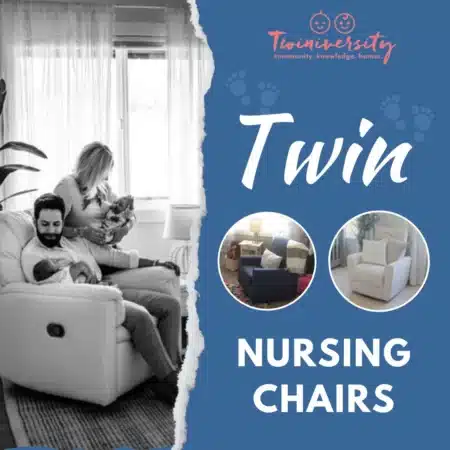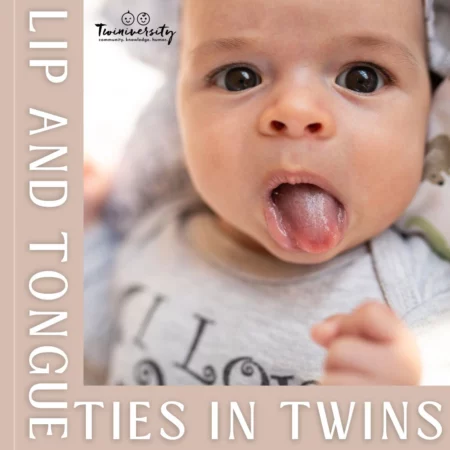Last updated on August 24th, 2023 at 06:38 pm
From the time my identical twin girls were able to express themselves, they were determined to prove that they were independent thinking and acting individuals. Their actions, however, proved that no matter how much they thought they were independent, they were (and always would be) connected to each other by some indescribable bond that only twins share.
When my twins were little, if one girl (and it did not matter which one) was in trouble, her sister would suddenly appear at her side in a silent sign of solidarity. As if to say, “If you are going to be mad at my sister then you might as well be mad at me too, because even though my sister pushed me to the ground and made me cry, I am here, standing by her side in case she needs me when she gets her time out.” That solidarity has been with them since the day they were born, when they cried inconsolably until they were placed in the same crib together, and it was still evident when they went off to junior high school.
Junior high is difficult to navigate for most girls; the friend groups are constantly changing. The mean girls are trying to push the others around, the homework gets more difficult, and the teachers get tougher. It seems even harder and more confusing for twins. My twins felt overly protective of their twin and annoyed by them at the same time.

The junior high girls were confused by the obvious closeness of my twins and they couldn’t figure out how to be friends with them. It’s as if two best friends were walking and talking in sync, finishing each other’s sentences with out knowing they were doing it, and along comes a third girl who doesn’t quite feel comfortable. It’s nothing she can put her finger on, but it’s there. It seems that although my girls wanted desperately to have many new friends, it was very hard for the junior high girls to understand the twin relationship and they sometimes even seemed envious of the twins built-in friendship. Their classmates also found that it was not as easy to boss the twins around as it was to boss around a single girl. The twins always had each other as back up which gave them incredible confidence and enabled them to act differently and go against the group, as others did not always do. For example, my twins would often stick up for the girl who was singled out and made fun of in the lunchroom.
Another difficult situation to maneuver was when one twin was invited somewhere and the other was not. The twin that was invited desperately wanted to go and she wanted to go by herself. The girl that was not invited did not understand why she was not invited and her feelings were hurt. When it came down to making the decision whether to go or not, the girl who was invited would not go without her twin. It was not that she needed her twin as a security blanket, it was that her twin was home with her feelings hurt and so she could not possibly go out leaving her twin home alone, sad, and unhappy. She was going to stay home in a show of solidarity to her twin. She was not happy about her decision, in fact she was mad that she was staying home, but she still would not go.
This happened on several occasions to both twins, so it was not as if one was more outgoing or better liked than the other. Neither twin ever went to a party or play date where her twin was not invited.
I’m not sure why or how a mom would have her daughter invite only one identical twin to something. It could be as simple as there was only one seat left in the car, or the friend was only allowed to invite a certain number of girls and only one twin made the list. Whatever the reason, it is painful as a parent to watch the twin who was not invited have hurt feelings and it is just as painful to watch the twin who was invited struggle with her decision over whether to go or not. Now, I know not every one can be invited to everything; however, when there are two girls in the same grade so much alike that most of the time the friends, their parents, teachers, and coaches cannot tell who is who, how do you explain the concept that not everyone can be invited… but your sister is? It was so much easier to explain why neither was invited. It’s logical to state, “Everyone cannot be invited all of the time. Invite them to our house and then the next time maybe they will invite both of you to theirs. Not being invited all of the time is part of life. It’s part of learning how to deal with disappointment.” Explaining to one of your identical twins why her sister was invited to the super fun party where everybody was going, except her twin, was exceptionally difficult.

My girls were looking for a best friend through out their years in junior high. They often felt left out and lonely. They felt it was unfair, unkind, and that many of the girls excluded them on purpose. They knew they had their twin but they also knew their twin was stuck with them, not chosen by them. The idea of a best friend that chose them of free will and that they chose back, to be with them through thick and thin, loyal to a fault, there for every happy and agonizing experience, a true best friend — that was what they wanted.
When my identical twin girls went off to junior high they were determined to make new best friends, distinguish themselves as individuals and conquer their new world and for the most part, they did. They had a large circle of friends, although not the true blue best friends they were in search of. They had plenty of laughs and adventures along with the rough times and their junior high experiences taught them valuable lessons that would serve them well in life; only they were not old enough to know it yet. My twins had not yet figured out that they were each other’s very best friends, through thick and thin with a constant show of solidarity. Through adversity comes strength and independence. There is also a closeness that comes from shared experiences. The twins learned empathy for one another and, of course, they had that incredible, indescribable bond from birth. One day my twins will figure out that they are the best friends that they have been looking for and their best friend has been there all along.

Lori Jones is the mother of four fun loving teenagers. She is a freelance children’s storybook and freelance poem writer, who finds herself laughing and crying while writing about her children, her memories and her family life.
An Addendum from Dr. Joan A. Friedman, PhD
Readers who are familiar with my research and writings will undoubtedly understand why I take issue with a few ideas put forth in this article. Primarily I feel that these girls were not given ample opportunities to develop their individuality. Burdened by the expectation to live up to the best friend ideal, both girls did not have the emotional freedom to make their own decisions. Consequently, they could not learn how to work through the disappointment and conflict that understandably accompanies situations when twins are not treated equally. The family’s emphasis on the girls’ needing to be best friends more than likely interfered with their capacity to feel like separate individuals. As I read the article, I felt that each twin’s preoccupation with finding a best friend conveyed an underlying wish to be her own person and discover what it’s like to feel a close connection to someone other than her twin sister.
The hundreds of young adult twins I have interviewed consistently point out how resentful and guilty they feel about making choices and decisions that reflect poorly on their twin. They feel so conflicted about enjoying their own successes because they recognize that their happiness may make their twin feel angry and upset. Sibling rivalry is certainly heightened among twins and buying into this best friend notion complicates and inhibits the healthy expression of jealousy and sadness that accompany twin differences. Nonetheless, these feelings need to be recognized and mutually respected so that twins can decide for themselves whether or not they truly want to be best friends.

Dr. Joan A. Friedman is a psychotherapist who has devoted many years of her professional career to educating twins and their families about twins’ emotional needs. Having worked through her own twinship challenges and parented her fraternal twin sons, she is a definitive expert about twin development. She is the author of “Emotionally Healthy Twins: A New Philosophy for Parenting Two Unique Children”. Her second book, “The Same but Different”, addresses the intricacies of adult twin relationships and is in stores now. Read more articles by Dr. Joan Friedman on Twiniversity.







